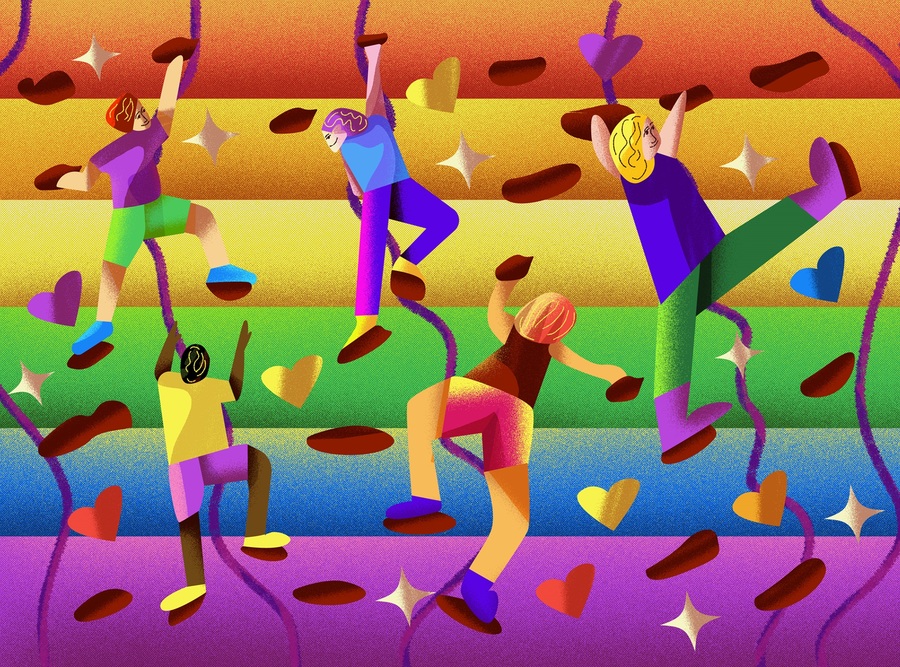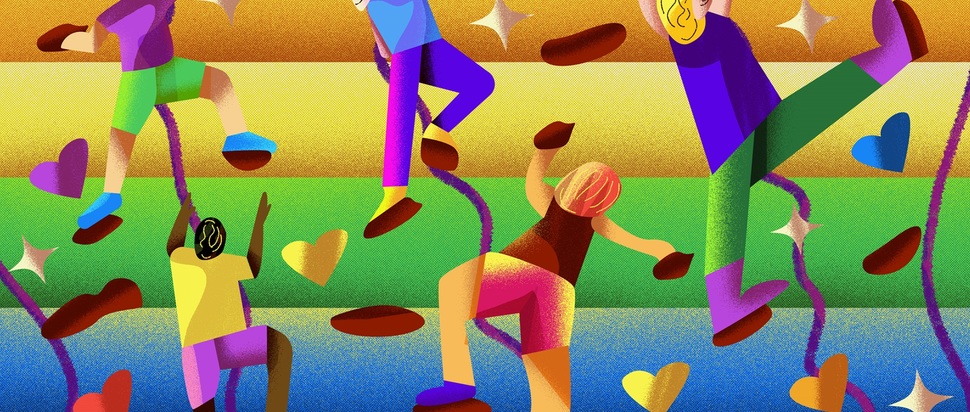A Queer Ascent: The joy of Scotland's queer climbing community
Chalk-on-hands, carabiner clips – the climbing centre is the new queer place to be. We speak to the frontrunners in Scotland's queer climbing scene about representation in sports, creating safe spaces, and finding self-acceptance through community
I watch a video of a woman hanging off a climbing hold, lip-syncing to a viral podcast clip. "Why do all lesbians climb? A sport that requires finger, forearm, arm strength, hip flexibility, problem solving, short fingernails." I’ve lost track of how many variations of this Instagram video I’ve scrolled past today. "The only thing that could make climbing better for lesbians is if we could use our tongues."
Their conclusion is a tad reductive, but in the few years I’ve been climbing, I’ve found a seed of truth in it. I first went climbing on a work bouldering trip, distracting myself from the end of a recent sapphic dalliance. It was unlike any sport I had experienced before. A facility where rainbow flags hung proud, a mid-session oat flat white was encouraged and friendly punters of all ages offered advice.
I was certainly not the first to find a queer affinity with Scotland’s climbing scene. The sport’s many forms – be it bouldering, speed, ice or lead – have witnessed a meteoric uptake in the last few years. The introduction of competition climbing into the 2020 Tokyo Olympics has aided its popularity, along with the likes of Harry Styles and Jason Momoa championing the recreation. So, how has a sport synonymous with six-packed men dangling off cliff faces become favoured by queer communities internationally?
The brilliance of climbing is its levelling quality. Rather than competing with others, you focus on the battle with your own strength, agility and determination. As Emma Davidson, a former competitive climber and head of Eden Rock Edinburgh’s youth team puts it; "It's a really nice alternative to more regimented sports, it helps you connect with your body."
Cam Proctor, overseer of Glasgow Queer Adventure, attests to this unity between the mental and physical. "When I'm not going to the climbing gym, I get hung up on what’s not masculine enough," he says. "I feel pretty dysphoric sometimes." While the sport is no silver bullet to self-acceptance, Proctor appreciates its advantages. "It really takes me out of my head and puts me into a physical space."
Proctor first entered a boulder room ten years ago, while in the process of transitioning. The accessibility of bouldering – an equipment-light, rope-free form of climbing – has made it a firm favourite of climbing newcomers. Unlike the bulk of Scotland’s queer social spaces, alcohol is not a customary ingredient. For non-drinkers, like Proctor, its sobriety is appealing. He reflects on his youth: "It would’ve been so handy to have that space... it would’ve been so good for me."

Illustration by Mahnoor Khan.
Since 2022, queer climbing nights have been a regular event at The Climbing Academy centres in Glasgow. Proctor has seen the collective flourish, "[The events] grew organically from the participants who were going." Today, the WhatsApp group stands at 150 members. "There’s this supportive culture," he explains. "They give us an instructor on our Sunday sessions for free, who is also queer."
Davidson has been witness to the sport’s shifting image since they first took to the walls at age seven. Despite initially believing it to be "a boy’s sport", Emma soon made the cut for their local youth team, and later the GB Development Squad. "I was lined up to go to three different Europeans, then COVID happened." Since the pandemic, Emma traded competitions for championing the sport’s queer community, staging the first dedicated queer nights in September 2022. "Those first two sessions were insane," they say. "There were so many people that showed up."
With countless queer nights, two pride parties and an ever-growing LGBTQ+ presence at Eden Rock, Davidson’s impact is being felt. Their fresh approach includes reclaiming playground activities. "We start our sessions off by doing a PE game, we’d play tig or dodgeball," Davidson explains. "For a lot of queer kids, [they didn’t] get involved in PE at school." Emma describes it as a "do-over", "a chance to experience those games in a happier environment." The sheer number of returners testifies to their thoughtful methods.
Last spring, Proctor and Davidson both attended Climb Out, the UK’s first queer outdoor climbing festival. The success of the event cemented Proctor’s intention to take Queer Adventures Glasgow out into the Scottish wilds. "There’s only a few people who have the experience and equipment," Proctor says. This sits in disproportion with the many climbers interested in these trips. "It would be nice to shift that balance eventually."
Similarly, Emma has set their sights on an instructor qualification, allowing them to lead groups on outdoor rock. "In Scotland, there aren't many instructors who have the qualification to take groups outdoor climbing," they say, noting that only a fraction offer a queer presence. Davidson credits their youth squad climbing coach, Rachael Carr, as their role model. "[She’s from] where I’m from," they explain. "Being that confident and that open was really inspiring to see."
The impact of queer representation in sport can’t be understated. "It’s nice to feel like you’re giving kids a representation," Davidson reflects. "[It] made me feel less alienated." There’s no doubt the visibility of Proctor and Davidson within Scotland’s climbing community will be having the same effect.
